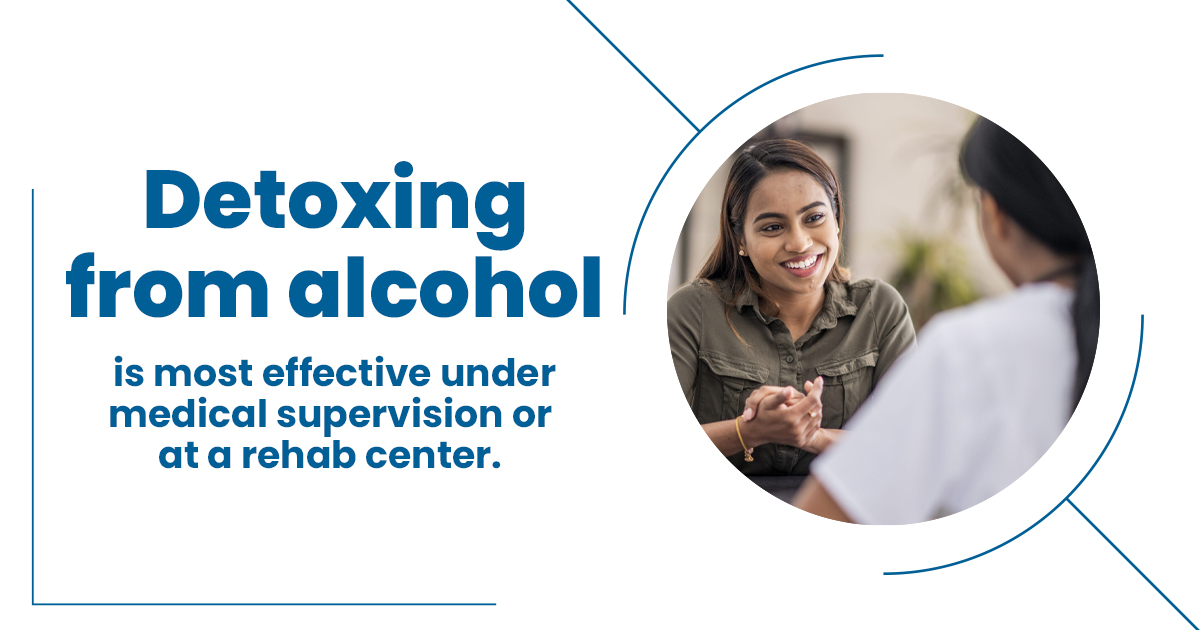Self-detox is a process in which someone tries to stop using drugs or alcohol without medical professionals’ help. Attempting to detox on your own can be challenging and even dangerous due to the withdrawal symptoms that can arise.
Have withdrawal symptoms weakened your willpower to quit drinking?
In this blog post, we will debate how to detox from alcohol safely at home and precautions to overcome risks. We will also cover what home detox entails, how you can prepare for it, and what other treatment options you can utilize to succeed in recovery and stay sober.
Key Takeaways
Alcohol addiction is a chronic disease that can cause serious side effects. To adequately recover from this condition, detox is suggested. Detoxing from alcohol is most effective under medical supervision or at a rehab center. You will find the below-mentioned information in this article;
- Detoxing at home seems comfortable and inexpensive, but some significant consequences can occur.
- Alcohol withdrawal symptoms may include seizures, hallucinations, heart failure, and death.
- In case you detox at home, concentrate on a balanced diet and toxin-fighting vitamins, hydration, and minerals.
Detox in a safe and secure environment with 24/7 medical professional monitoring at the Haven Detox New England to overcome addiction and stay sober. Contact us by dialing (844) 933-4145 and learn more about our treatment programs.

Understanding detox procedure
According to National Institute research, Americans with alcohol use disorder (AUD) are estimated to be 15 million as of 2019, but only about 7% of those people receive treatment. Many people are at risk of unpleasant, severe, and even fatal withdrawal symptoms.
Detoxification at home is an outpatient procedure done under the guidance of medical specialists. People with mild to moderate alcohol use disorders may be able to safely detox from alcohol at home. It can be harmful to detox alone.
There are various things you can do to make the process of detoxing from alcohol at home safer and more effective. Following are some steps you need to take;
- Try to get someone company while detoxing.
- Have enough time for weeks so that you can detox completely.
- Make sure alcohol isn’t available in your home.
- Drink plenty of water.
- Consume healthy vegetables and fruits daily.
- Avoid meeting people who can offer you alcoholic drinks.
- Practice things that make you relax, like yoga and exercise.
- Get instant medical supervision if severe symptoms occur.
It is best to get a diagnosis and treatment strategy from a doctor before starting the detox procedure. At-home detox is not recommended because the level of safety varies from person to person. This will depend on the extent of alcohol abuse.
Detoxification should be avoided by individuals with alcohol use disorders (AUD). With supervision and guidance, a sustained, successful recovery is more likely. Checking in with your doctor to ensure it is safe is the first and most crucial stage of at-home alcohol detox. Additionally, they can offer you medicines that will assist the process to go more smoothly.
Common Dangers of Self-Detox
Alcohol detox isn’t easy; not everyone can do it independently. This difficulty is why medical professionals administer alcohol detox, and alcohol withdrawal treatment at rehab facilities throughout the country risks associated with self-detoxification include:
- Low success rates, a lack of access to resources, and expert therapy.
- A greater intensity of withdrawal symptoms, difficulty avoiding triggers, and lack of medical treatment in the event of significant difficulties.
- The possibility of life-threatening symptoms, such as heart failure, delirium, hallucinations, and convulsions
Alcohol Withdrawal Symptoms
Many people experience severe withdrawal symptoms. Syndrome and its symptoms are quite dangerous. These symptoms may include:
- Hallucinations
- Tremors
- Seizures
- Insomnia
- Sweating
- Nausea
- Vomiting
- Elevated heart rate and blood pressure
- Delirium tremens (DTs
In case you and your family members experience alcohol withdrawal symptoms, it is recommended to seek immediate medical attention from your primary care provider. Proper use of medication can help safely treat mild symptoms.
Self-Detox: Pros and Cons
Pros of home detox include the following:
- Comfort
- No financial obligations
- Anonymity and confidentiality
- Allows you to continue work responsibilities
- Access to family and friends
The cons of detoxing at home include the following:
- Higher risk of undesirable mental health effects such as
- high blood pressure
- Lack of medications means limited symptom relief
- Higher risk of dangerous physical health effects
- Potential harm to relationships during the discomfort of withdrawal
- Increased possibility of a setback occurring
Tips to Manage Withdrawal Symptoms at Home
People can manage alcohol withdrawal symptoms better when detoxing at home. For example:
- Drink plenty of water.
- Eat healthy foods.
- Take vitamins and supplements.
- Get a first-aid kit.
- Get plenty of sleep.
- Find support from loved ones and healthcare providers.
Alcohol Addiction Treatment Options
Consult healthcare professionals before starting any at-home detox if you are thinking about it. Healthcare providers can help you choose the most suitable and secure action. There are many readily available therapeutic alternatives, nevertheless with
- Residential Treatment
- Partial Hospitalization Treatment(PHP)
- Medication-Assisted Therapy
- Support Groups
Inpatient Treatment:
If you decide to undergo withdrawal at an inpatient treatment center, you will get access to 24-hour medical care from a staff of medical experts. For persons who have been drinking alcohol for a long time or who drank too much alcohol while addicted, inpatient therapy is typically advised.
Another advantage of inpatient treatment is that a doctor can issue prescriptions for drugs to assist you in managing your withdrawal symptoms if necessary.
Drugs Used in Alcohol Detox
Alcohol is a tranquilizing of the central nervous system that affects glutamate and GABA4, as well as other neurotransmitters in the brain. Excitation of the central nervous system happens when a person stops drinking or cuts back on their consumption, which causes withdrawal symptoms. To help manage alcohol withdrawal, various medications may be used, such as:
Benzodiazepines: These drugs aid in the prevention or reduction of withdrawal symptoms, including seizures. In general, long-acting medications are recommended, such as Diazepam (Valium). However, people with impaired liver function would benefit more from taking intermediate-acting benzodiazepines like lorazepam.
Anticonvulsants: According to some studies, drugs like carbamazepine may help lessen the desire to drink alcohol; nevertheless, further clinical research is required.
Beta Blockers: These medications may treat tremors and control blood pressure and heart rate.
Nutritional Therapy: Due to dehydration and altered electrolyte levels, IV fluids may be administered, along with specific vitamins and minerals, such as thiamine (Vitamin B1), magnesium, and multivitamins.
Partial Hospitalization Treatment: Partial hospitalization is a good idea to cure withdrawal symptoms. An organized mental health program and type of addiction therapy called a partial hospitalization program (PHP) entails individuals participating in activities during the day and going home at night.
Residential or inpatient treatment institutions offer these services. PHPs allow patients to continue living outside medicine while providing structured, thorough care. Because they do not call for an overnight stay, they are sometimes referred to as intensive outpatient programs (IOPs) or day programs. Programs for those in partial hospitals who have been diagnosed with symptoms of alcohol withdrawal:
Medication-Assisted Therapy: MAT involves treating substance use disorders with therapy and FDA-approved medications. Opioid and alcohol addictions are the main targets of this therapeutic strategy. A whole-patient approach in the form of cognitive behavioral therapy to treating substance use disorders is made possible by combining medications and behavioral therapies.
According to studies, a combination of medication and therapy can effectively treat these disorders. For some people who are dealing with addiction, MAT can support recovery.
Support Groups: Many addiction treatment programs must include support groups. The most well-known organizations are 12-step programs and Alcoholics Anonymous (AA). They support personal development, keep people on track with their rehabilitation, and let them connect with other people going through similar things.
To properly rehabilitate from addiction, peer support is essential. After treatment, support groups are a critical tool that can support long-term sobriety and well-being. Some support groups may include a spiritual component to help in rehabilitation.
Frequently Asked Questions(FAQS)
What is the safest way to stop drinking?
Drinking by ten percent a day can help reduce your drinking habit. For example, try reducing this to 18 units daily if you drink twenty units a day. Drinking at this reduced level for four days, then try to cut it down by another ten percent. If you notice any withdrawal symptoms, you are cutting down too fast.
How Can I Clean My Body After Drinking?
Following are some tips you can utilize to clean your body after drinking.
Get Some Sleep.
Drink Lots of Fluids.
Get balanced Food.
Sweat the Alcohol Out.
What can I expect if I stop drinking alcohol?
You may see withdrawal symptoms, including hand tremors, retching, excessive sweating, restlessness, and anxiety. Alcohol cravings, reduced energy, and feeling low or depressed are common. Sleep is likely to be disturbed.
Get Professional Help at Haven Detox, New England
Alcohol addiction is a chronic mental illness and can result in severe outcomes. Haven Detox New England understands the challenges of detoxing from alcohol and aims to make the process as safe and comfortable as possible.
We provide a wide range of addiction treatment programs, including medical detox treatment, residential treatment programs, and multiple therapies to assist people in detoxing from alcohol in a safe and supportive environment.
In addition, our customers are around the clock available for all clients to answer their queries and help them to get instant admission at Haven Detox New England.
Contact us at (844) 933-4145 to learn more about our treatment programs and service charges.




